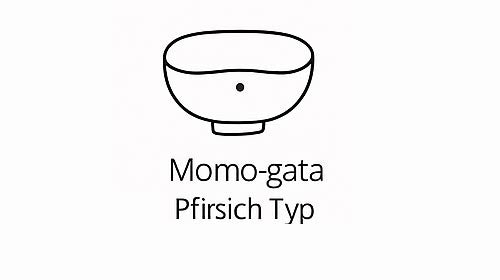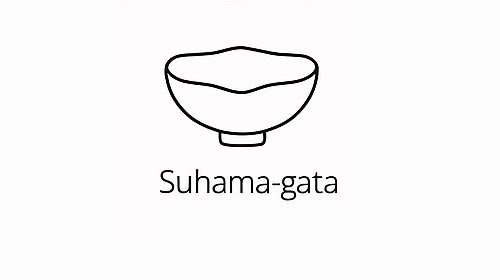The Momo-gata chawan is a vessel full of softness, grace, and subtle symbolism. "Momo" (桃) means "peach," and thus the shape of this bowl reflects the soft, rounded lines of a ripe peach fruit—a symbol of good luck, longevity, and feminine energy in East Asian culture.
The Momo-gata is not used frequently, but when it is used, it is in moments of gesture, tenderness, and inner joy.
Shape & Characteristics
The Momo-gata is characterized by its gently rounded, bulbous shape , which tapers slightly toward the top—like the fruit it is modeled after. It typically features a slight bulge or a gentle indentation , reminiscent of the line that divides a peach in half.
The opening is usually medium-wide, the body deep and softly crafted. It sits weightlessly in the hand, almost like a fruit nestling against your hand. It emphasizes tactile sensuality—contact with the surface is part of the experience.
Origin & Meaning
The Momo-gata probably originated as a free interpretation during the late Edo period or early Meiji period, inspired by the flower and fruit motifs from Japanese Kaiseki cuisine and the seasonal aesthetics of tea .
In East Asia, the peach is considered a symbol for:
-
Longevity (Taoism)
-
fertility
-
Feminine beauty
-
Gentleness in strength
In the tea ceremony, the Momo-gata is often used to emphasize precisely these values - for example in ceremonies for birthdays , anniversaries or to usher in spring .
Materials & Glaze
Momo-gata is usually made in Seto or Kyoto , with a focus on hand-formed details. Typical glazes include:
-
Pale pink or cream Shino glazes
-
Kohiki with a rosy tint
-
Craquelure or light brushwork to emphasize the softness
The kōdai (foot ring) is often slightly drawn inwards, which further enhances the fruity impression.
Use & effect
This bowl is used:
-
in spring-like ceremonies with a feminine focus
-
at ceremonies for special guests who value gestures and symbolism
-
as a collector's item in artistic contexts
It is suitable for usucha because the open interior allows for airy beating.
Aesthetics & Symbolism
The Momo-gata chawan is a vessel of tenderness and symbolism. It reminds us that there is room for softness even in ritual. It connects the circle of life with the flavor of the moment.
It stands for grace, harmony and playful depth – and stands out from the stricter forms of the tea path.




Leave a comment
This site is protected by hCaptcha and the hCaptcha Privacy Policy and Terms of Service apply.